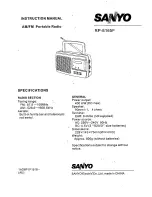
EN
31
required to be registered with local
utility companies.
• If the generator is used at a
construction site, there may be
additional regulations which must be
observed.
3) AC APPLICATIONS
Before connecting an appliance or
power cord to the generator:
• Make sure that it is in good working
order. Faulty appliances or power
cords can create a potential for
electrical shock.
• If an appliance begins to operate
abnormally, becomes sluggish
or stops suddenly, turn it off
immediately.
Disconnect the appliance, and
determine whether the problem is
the appliance, or if the rated load
capacity of the generator has been
exceeded.
• Make sure that the electrical, rating
of the tool or appliance does not
exceed that of the generator.
Never exceed the maximum power
rating of the generator.
Power levels between rated and
maximum may be used for no more
than 30 minutes.
NOTICE: Substantial overloading
will switch off the circuit breaker.
Exceeding the time limit for
maximum power operation or slightly
overloading the generator may not
switch the circuit breaker OFF, but
will shorten the service life of the
generator.
Limit operation requiring maximum
power to 30 minutes.
For continuous operation, do not
exceed the rated power.
In either case, the total power
requirements (VA) of all appliances
connected must be considered.
Appliance and power tool
manufactures usually list rating
information near the model number or
serial number.
4) AC OPERATION
1° Start the engine
2° Switch the AC circuit breaker ON.
3° Plug in the appliance.
Most motorized appliances require
more than their rated wattage for
start-up.
Do not exceed the current limit
specified for any one receptacle. If
an overloaded circuit causes the AC
circuit breaker to switch OFF, reduce
the electrical load on the circuit, wait
a few minutes and then reset the
circuit breaker.
5) DC OPERATION
DC TERMINALS
The DC terminals may ONLY be used
for charging 1 volt automotive type
batteries.
The terminals are colored red to
identify the positive (+) terminal and
black to identify the negative (-)
terminal.
The battery must be connected to
the generator DC terminals with the
proper polarity (battery positive to
generator red terminal and battery
negative to the generator black
terminal).
DC CIRCUIT PROTECTOR
(OR DC FUSE)
The DC circuit protector (or DC
Fuse) automatically shuts off the DC
battery charging circuit when the DC
circuit is overloaded, when there is
a problem with the battery, or the
connections between the battery and
the generator are improper.
The indicator inside the DC circuit
protector button will pop out too
show that the DC circuit protector
has switched off. Wait a few minutes
and push the button in to reset the
DC circuit protector.
CONNECTING THE
bATTERY CAbLES:
1° Before connecting charging
cables to a battery that is installed
in a vehicle, disconnect the vehicle’s
grounded battery cable.
WARNING:
The battery gives off explosive gases;
keep spark, flames and cigarettes
away.
Provide adequate ventilation when
charging or using batteries.
2° Connect the positive (+) battery
cable to the battery positive (+)
terminal.
3° Connect the other end of the
positive (+) battery cable to the
generator.
4° Connect the negative (-) battery
cable to the battery negative (-)
terminal.
















































